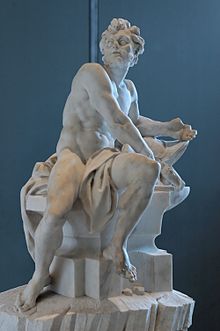| Hephaestus | |
|---|---|
God of fire, volcanoes, metalworking, artisans, metallurgy, carpenters, forges, sculpting, and blacksmiths | |
| Member of the Twelve Olympians | |
 Hephaestus at the Forge by Guillaume Coustou the Younger (Louvre) | |
| Abode | Mount Olympus |
| Symbol | hammer, anvil, tongs |
| Genealogy | |
| Parents | Zeus and Hera, or Hera alone |
| Siblings | Ares, Hebe, Eileithyia, and many paternal half-siblings |
| Consort | Aphrodite (divorced) Aglaea |
| Children | Thalia, Erichthonius, Eucleia, Eupheme, Philophrosyne, Cabeiri and Euthenia |
| Equivalents | |
| Roman | Vulcan |
| Part of a series on |
| Ancient Greek religion |
|---|
 |
Hephaestus (UK: /hɪˈfiːstəs/ hif-EE-stəs, US: /hɪˈfɛstəs/ hif-EST-əs; eight spellings; ‹See Tfd›Greek: Ἥφαιστος, translit. Hḗphaistos) is the Greek god of artisans, blacksmiths, carpenters, craftsmen, fire, metallurgy, metalworking, sculpture and volcanoes.[1] Hephaestus's Roman counterpart is Vulcan. In Greek mythology, Hephaestus was either the son of Zeus and Hera or he was Hera's parthenogenous child. He was cast off Mount Olympus by his mother Hera because of his lameness, the result of a congenital impairment; or in another account, by Zeus for protecting Hera from his advances (in which case his lameness would have been the result of his fall rather than the reason for it).[2][3][4]
As a smithing god, Hephaestus made all the weapons of the gods in Olympus. He served as the blacksmith of the gods, and was worshipped in the manufacturing and industrial centres of Greece, particularly Athens. The cult of Hephaestus was based in Lemnos.[1] Hephaestus's symbols are a smith's hammer, anvil, and a pair of tongs.
- ^ a b Walter Burkert, Greek Religion 1985: III.2.ii; see coverage of Lemnos-based traditions and legends at Mythic Lemnos
- ^ Graves, Robert (1955). The Greek Myths: 1. Harmondsworth, Middlesex, England: Penguin Books. p. 51. ISBN 0736621121.
- ^ Cite error: The named reference
Footwas invoked but never defined (see the help page). - ^ Cite error: The named reference
Herawas invoked but never defined (see the help page).